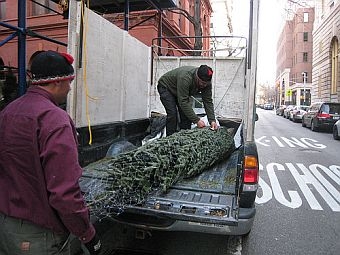 (Host) December is typically a good time for business. And one of the best places to sell things is New York City. That’s why every year a number of hardy tree farmers make the long trip south and stay for several weeks to sell Christmas trees.
(Host) December is typically a good time for business. And one of the best places to sell things is New York City. That’s why every year a number of hardy tree farmers make the long trip south and stay for several weeks to sell Christmas trees.
The urban-rural connection helps keep these farms going. But it has also forged friendships between farmers and New Yorkers.
As part of a collaboration of northeast stations, Amy Eddings from WNYC reports.
(Eddings) Adam Parke is trimming one of his Christmas trees on a street corner in Brooklyn. The 54-year-old is 350 miles, and light years away, from his tree farm in Vermont.
(Parke) "It’s high on a mountaintop, looking across a broad valley to the main range of the Green Mountains. You can see a long way into Canada from there."
(Eddings) He’s got 216 acres and 50,000 evergreen trees. The nearest town, Barton, is mostly forest and dairy farms.
(Parke) "It’s a small, going-to-seed northeastern Vermont town, not doing too well."
(Eddings) He says the Christmas tree retail season is critical to his farm and his helpers. There are nine this year, including his son and daughter.
The process starts in Wheelock, Vermont, where a crane loads about 850 trees onto a tractor trailer. Greg McNally is helping out. He’s got his own tree farm.
(McNally) "We charge about $35 if you come and cut your own tree here. I think that same tree is probably $60 or $70 in New York."
(Eddings) Few Vermont farmers brave the six hour drive, and the logistical hurdles, of selling in New York City. Adam Parke has been doing it for 19 years, and has six sites in Brooklyn. He enjoys the challenge.
(Parke) "I think it’s the contrast. Where we live is so different from here. We come here and we see a completely different life. We get a chance to deliver trees into other people’s homes and get a glimpse of how they live."
(Eddings) For Bill Dalmyer, that contrast is stark.
(Dalmyer) "I live pretty much without electricity and running. I live back in the woods, it’s pretty quiet."
(Eddings) Despite all their talk about experiencing another way of living, no one strays very far from their tree stalls. No Broadway shows, no sightseeing, just 12 hours a day of work. Parke helps deliver and set up an 11-foot tall Balsam for a young family in Brooklyn Heights.
(Brooklyn Mom) "Hey guys, do you wanna see the tree?"
(Parke) "Did you help pick the tree out? Good job!"
(Eddings) Parkes’ 29-year-old son, Gaylan, says New York City’s action has a way of coming to them. Like the night when a tipsy executive, walking home from an office party, offered to help them unload.
(Gaylan) "And he realizes he’s getting his pants dirty. So he stripped, he took his pants off. So he’s in his dress shoes, knee high socks, boxers, and an undershirt, on top of the truck, unloading trees with us."
(Eddings) The reward at the end of a long day is a sleeping bag, on the apartment floors of Parke’s friends. Jane Hamburger is one of them. She gestures to a small living room, littered with sleeping bags.
(Hamburger) "When it gets really crowded, I don’t even pretend to know who’s coming and going."
(Eddings) Hamburger’s been doing this for ten years.
(Hamburger) "I like having them here. All my friends think it’s terrific that they stay here. It’s just a great way to spend the month before Christmas."
(Eddings) Christmas trees will be sold until late Christmas Eve. Then, the team will pile into a car, still smelling like Balsam, and head north, arriving home around two on Christmas morning. For tree farmer Adam Parke, the best part of the holiday season is when it’s almost over.
For VPR News, I’m Amy Eddings.
(Host) Northeast environmental reporting is made possible, in part, by a grant from United Technologies.